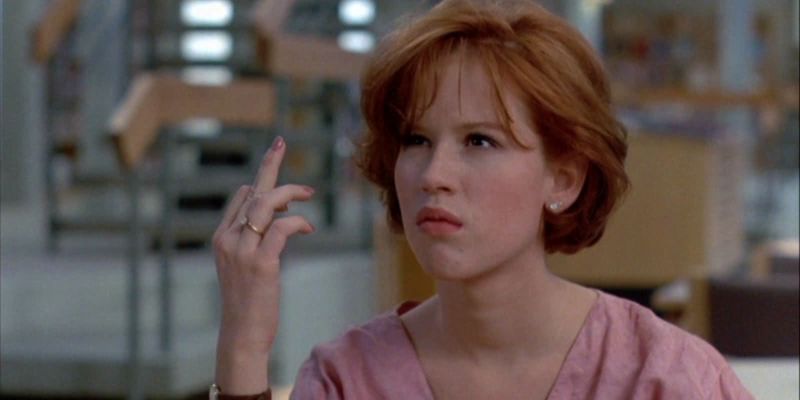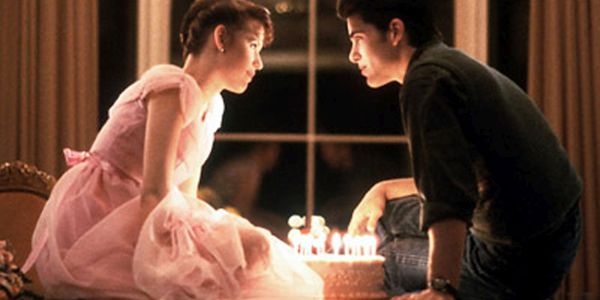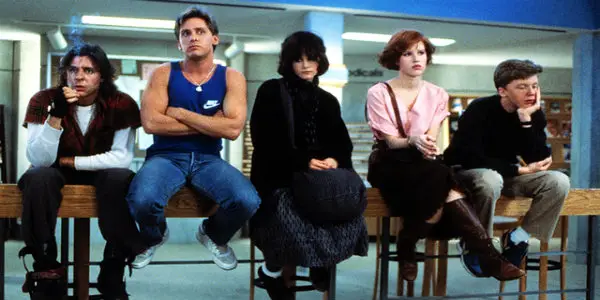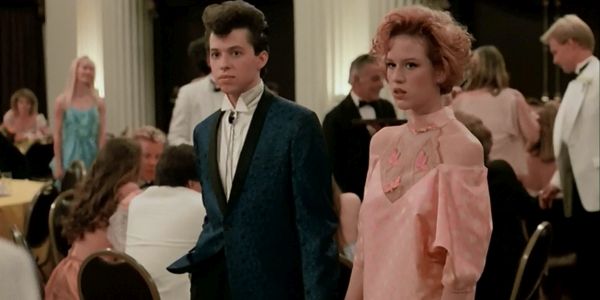Molly Ringwald’s Films with John Hughes

Alex has an unhealthy obsession with classic films.
John Hughes had the innate ability of tapping into the voice of a generation unlike any other director I’ve seen. His movies continue to make a lasting impact on the film industry – and it’s easy to see why. Ferris Bueller’s Day Off, The Breakfast Club, Pretty In Pink and a plethora of other “teen” films that redefined the genre, gave thousands of hearts and minds a voice – something coveted if you were an angsty teen growing up in the mid-eighties. And in the middle of that redefinition was a young woman named Molly Ringwald.
Ringwald was an important cornerstone in Hughes‘ success as a filmmaker. In fact, the film that gave her the most notoriety was the classic coming-of-age tale Sixteen Candles. Ringwald was just sixteen at the time (go figure), but the movie started a relationship between the two that would span about three years and three movies. Ringwald was due to act in another Hughes‘ film titled Some Kind of Wonderful, but Ringwald declined, thus ending a working relationship that could’ve expanded far beyond what was created.
The good thing is, the films they did do together are considered modern classics. Not only have they managed to be movies etched in our subconscious, but also films that defined a decade.
Sixteen Candles (1984)

In John Hughes’ directorial debut, Sixteen Candles, Molly Ringwald stars as Samantha Baker, a recently turned sixteen year old whose day spirals out of control after her parents forget her birthday. What ensues for the duration of the film are the personal escapades Samantha faces throughout the day which eventually culminates in the greatest birthday wish of all – true love (a consolation prize, I think, considering how her day went.)
When writing the script to Sixteen Candles, Hughes had Ringwald in mind to play the lead when he received a headshot of the fledging actress. John Hughes was a workhorse, he was known to lock himself in his house and just write for hours upon hours, creating wonderful scripts that would take even the average screenplay writer a few months. Unsurprisingly, it took him just three days to write this particular script.
If I were discussing the filmography of Hughes to someone whose never seen any of his films, Sixteen Candles is the first film I would have the pleasure of showing them. This film has become a staple in American pop culture: from newly engaged couples recreating the famous end shot (seen above) on their own kitchen tables, to sixteen year old girls wishing they could have a Jake Ryan of their own, the movie has easily created a lasting impression on most people, and will continue to do so.
The Breakfast Club (1985)

After you watch this film, you’ll begin to reevaluate your life wondering if you fit into one of five stereotypes: a nerd, a jock, a rebel, a princess, or a recluse – this is where The Breakfast Club comes in. The film stars Judd Nelson, Ally Sheedy, Molly Ringwald, Emilio Estevez, and Anthony Michael-Hall. The movie tells a story of five teenagers who are stuck in detention on a Saturday morning, none of whom are in the same social groups. As the day progresses, they gradually start to learn more about each other, and eventually a little bit more about themselves.
I have a unhealthy obsession with this film. Whenever it’s running on television I always have it on, even as background noise. Although it is technically categorized as a drama, (ok, more like a comedy-drama) it not only makes you laugh, but I can honestly say it’s made me tear up a little and I think that’s a testament to John Hughes.
The only other ‘teen’ films released before The Breakfast Club were Porky’s and The Fast Times at Ridgemont High. These films had the allure of being teen movies but never really got beyond the superficial layer of issues they were portraying on screen. Most of the time, main themes of these movies were usually about sex or drugs, and never bothered to delve deeper into those subjects, or how they might affect that fifteen/sixteen year old sitting in the theater watching it. Hughes had the ability to relate to teenagers, he took them seriously, and that seriousness is certainly prevalent in The Breakfast Club.
Pretty In Pink (1986)

I will preface this by saying, I don’t particularly like this movie. Not because it isn’t good, or the acting performances are bad, or even the fact that the butt ugly prom dress Molly Ringwald wears in the final third of the film should be sent to the pits of hell. No, it’s because of its unsatisfactory ending.
The film stars Jon Cryer, Molly Ringwald, Andrew McCarthy and Harry Dean Stanton. Ringwald stars as Andie, a girl who is lives in the lower middle class, which forces her to shop for terrible vintage clothes that fit her budget. I mention this because there is a clear divide between her two suitors, played by Cryer and McCarthy. Cryer plays Duckie, a friend of Andie who’s been in love with her since they were kids. He’s always let his feelings known, but Andie never reciprocates.
Then, one day, out of the blue, another guy comes along and sweeps her off her feet. McCarthy plays Blane McDonnagh, a quintessential eighties yuppie with a thing for our protagonist – he’s infatuated with Andie. So much so, there’s a point in the movie where he unintentionally offends her by taking her to an upper class house party where his “friends” proceed to berate her.
Now, he sounds terrible right? Yes, yes he does. But, what baffles me is at the end of the film (spoiler warnings ahead) when it comes time to pick between her childhood love and ‘Boring’ Blane McDonnagh, she chooses the latter. This decision just confuses me. Throughout the movie, Blane did nothing but make her uncomfortable. I suppose you can make the argument that she wanted to get out of the lower middle class lifestyle she was living by “marrying” up so to speak. But, realistically you would think Andie would come to her senses, no?
I think the ending can be attributed to audiences’ reacting poorly to the original ending, which was indeed, Andie getting with Duckie. Even Jon Cryer in an interview with Entertainment Weekly, disproved of the ending:
“I was disappointed. You sorta go, ”Oh, guess I’m not the leading man.” But I think it was kind of appropriate. Duckie always thought he was the leading man, and that was his fatal flaw…. John was trying to do something about crossing class lines and felt that with the ending as it was.”
I guess one can dream. I’ve always been a hopeless romantic, and that specific ending would probably reaffirm my feelings.
The Inevitable Falling Out
Ringwald and Hughes were going to collaborate on another film titled Some Kind of Wonderful, but Ringwald declined citing that “she was ready to graduate from high school.” The role would eventually go to Mary Stuart Masterson, but the lasting sting from hearing “no” would subsequently lead to 20 years of no communication.
As much as I enjoy these films, (barring Pretty in Pink), by that time, Molly Ringwald was already being typecast, and for any actor that is almost certain death. I totally understand why she would turn down another film with Hughes. She was ready to branch out, and she did with films like The Pick Up Artist, King Lear, and would ultimately go on to land a recurring role on the ABC Family show The Secret Life of An American Teenager.
John Hughes would go on to become pretty successful, I would say, Home Alone, Ferris Bueller’s Day Off, Planes, Trains, & Automobiles and the National Lampoon series are all staples of his filmography. Unfortunately, in 2009 Hughes passed away of a heart attack at the age of 59. To celebrate his life and films, Ringwald wrote an op-ed for The New York Times. It was a sweet and sentimental way of showing appreciation for the films that they not only collaborated on, but also shared with the world.
Which John Hughes film was your favorite?
(top image: The Breakfast Club – source: Universal Pictures)
Does content like this matter to you?
Become a Member and support film journalism. Unlock access to all of Film Inquiry`s great articles. Join a community of like-minded readers who are passionate about cinema - get access to our private members Network, give back to independent filmmakers, and more.
Alex has an unhealthy obsession with classic films.












